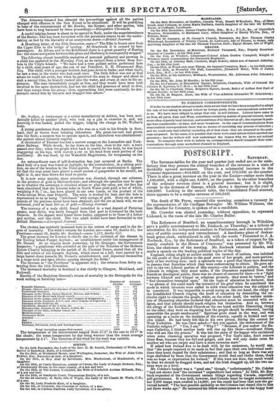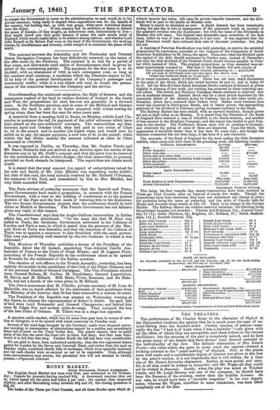The Reformers of Bradford, an unparliamentary borough in Wiltshire, gave
a public entertainment to Mr. Roebuck, on Thursday," as a tribute of admiration for his independent conduct in Parliament, and strenuous advo- cacy of public economy and retrenchment. A handsome piece of drakes- head green cloth, embroidered in silk with the words "Presented to J. A. Roebuck, Esq., by the Reformers of Bradford, as a token of respect for his manly conduct in the House of Commons," was presented by Mr. Wil- kins, the chairman of the meeting. Mr. Roebuck returned thanks, and made a speech on the leading political topics of the day. England, riding singly at anchor amidst the turmoil of nations, was indebted for the credit of that position to the good sense of her people, and more particu- larly of her working-men: such a spectacle was a proof that those men deserved to possess that franchise which they were endeavouring to obtain. He gave ad- vice to the two Liberal parties of this country—the Liberals in politics, and the Liberals in religion: they must unite; if the Dissenters separated from their friends on theological points, there was no chance of success for them—in a "fight between Church and Chapel on religious grounds, they must be beaten," and "find themselves trampled upon." On the topic of education he declared, that "no phrase of his could mark the intensity of his grief when he considered the mode in which interests were called to work when education was the subject to be considered. It was impossible to avoid seeing on the one hand, the clergy of the Established Church ringing the knell of education by demanding the ex- clusive right to educate the people, while, on the other hand, the various minis- ters of Dissenting churches declared that education must be connected with re- ligion, and that nobody should teach religion but themselves. And so, between the clergy of the Established Church on the one hand and the Dissenting clergy on the other, they went on disputing how the people should be educated, leaving meanwhile the people uneducated." Spiritual pride stood in the way, and was operating as a curse on the destinies of the country, equally in Ireland and OUT own island. He had lately felt this in his own person, during the contest for West Yorkshire. He was there asked—" Are you against the endowment of the Catholic religion ?" "Yes, I am." " Why ? ' "Because, if you endow the Ro- man Catholics, I think another body will rise up like them—mendicant friars, who will act like the priests." It was but the story of the beggar who exclaimed when some cleansing operation was proposed, "For God's rake, don't remove those fleas, because they are full and gorged, and you will only make room for another set who are empty and have a more ravenous maw." If asked how Ireland was to be dealt with by the statesman, he would say, that "the people required to be made to feel that upon their own individual exer- tions they must depend for their subsistence ; and that so long as there was any hope cherished by them that the Government would feed and clothe them, there was no hope or expectation for Ireland." If this were not done, the result would be that we should be dragged down, and not the Irish dragged up, till the two na- tions were on a level.
Mr. Cobden's budget was a "good one," though, "unfortunately," Mr. Cobden "had not shown how' the increased" expenditure had arisen." In 1835, Mr. Roe- buck requested of the Government certain things regarding Canada, especially self-government. It was held, however, that Canada must be taught submission; her 2,000 troops were swelled to 14,000; yet the result had been that now she go- verned herself. The best possible authority on the Colonies bad stated this to bun not three weeks ago." He entreated his fellow countrymen to stize the happy hour
to compel the Government to carry on the administratioa as each would do in his private concerns; being ready to expend when expenditure was for the benefit of the country, but holding fast, as with iron grasp, when mere individual desires were the object. . . . If this country had no ambition or desire to disturb the peace of Europe—if they sought, as industrious men, industriously to live— they might throw into that great balance of peace the calm serene mind of England, which would enable them to be arbiters among nations; and whether Lord John Russell or Sir Robert Peel were at the head of the Government, the working classes, by steadfastness and honesty, could compel it to maintain the peace of the world.































 Previous page
Previous page